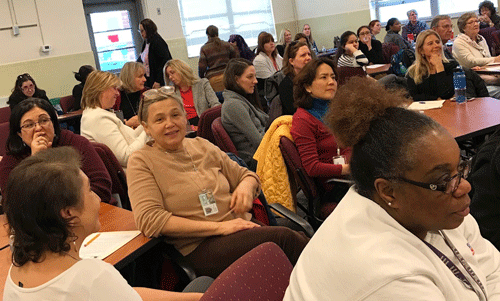
In a jam-packed room, educators, parents, social workers, therapists and county leaders came together for an important conversation about youth anxiety across our community.
Together, around 100 attendees collaborated on ways to better identify anxiety in young people, strengthen teen resiliency and coping skills, and raise awareness of supportive opportunities and interventions.
The annual community forum was held March 5 at the FCPS Virginia Hills Center, presented by the Fairfax-Falls Church Community Services Board (CSB) and the Advisory Board for the Joe and Fredona Gartlan Center in Mount Vernon.
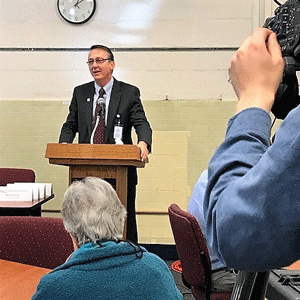
Dr. Scott Brabrand, Superintendent of Fairfax County Public Schools (FCPS), offered warm welcoming remarks and issued a challenge to the crowd. “We need to create environments where we offer permission to kids – and each other – to take our foot off of the accelerator; it’s ok to go the speed limit. Slow down. Perfection is not the goal here, doing your best is the goal.” He cited youth survey statistics that showed positive signs with reductions in bullying and use of alcohol and tobacco. He also acknowledged that many children and teens feel great stress and that while we’re doing well academically, we have much more work to do to meet the socioemotional needs of our children. “How do we work collaboratively to find children who are not involved in extracurricular activities? We must challenge ourselves to find these kids and work to connect them to activities.” We need to slow down, listen, and remember that stress and anxiety don’t just happen to 'some kid;' they happen to all of our kids.”
Keynote speaker Dr. Erin Berman, a psychologist with the National Institute of Mental Health (NIMH) offered insights about identifying anxiety in children, the science of anxiety, and practical coping strategies.
She shared some red flags that can help identify youth anxiety:
- Avoidance of school, school work, activities.
- Sleep disturbances.
- Distress at home.
- Persistent (more than a couple of months) worry over large catastrophic events.
- May appear perfectionistic.
- Stomach/headaches.
- Oppositional behavior (not trying).
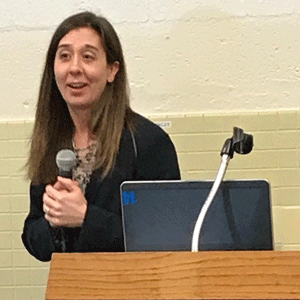
“One in four of us will experience anxiety. I urge all of us to embrace anxiety and to acknowledge that we will never succeed in completely erasing it from our lives. By learning about it, we work together to 'call it out' and look at ways to cope together. We strengthen our children when we equip them with coping skills. I urge parents to tell their children when they feel (or have felt) anxious or scared – these small personal disclosures can go a long way toward normalizing anxious feelings and helping open the door to conversation. Kids won’t feel so alone in their fears; parents can be a calming influence. Providing empathy, support and acceptance helps children cope.”
View Dr. Berman's full presentation.
Following Dr. Berman, a panel of local experts examined a look at teen gang participation through a trauma-informed lens. Ed Ryan, Director of Fairfax County Gang Prevention, said “We need to keep an eye out for those kids that have a tough time making friends and may be more vulnerable to being exploited by gang members. We’re looking at younger children; age 12 or 13 is the average age gang recruiters target. Connecting kids to positive activities to prevent drifting to the negative influences is critical and it takes a strong collaborative effort.”
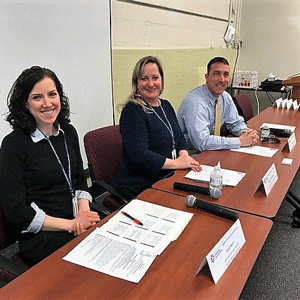 Meredith McKeen, with Northern Virginia Family Service (NVFS), works with recently immigrated youth. “Many of these kids have experienced serious trauma, they feel in fear for their lives, they may have spent years apart from parents or family members and it can be very hard to reunite. We work to help provide positive supports and try to help young people see a positive future for themselves.” Kate Reen, also from NVFS, discussed her work to help provide skills to children and families they see. “We have a vision of long term recovery. We work to meet the needs of individuals and families, from anger management and communications skills to how to make informed decisions and access resources. We are there to partner and help immigrants navigate stressful circumstances.”
Meredith McKeen, with Northern Virginia Family Service (NVFS), works with recently immigrated youth. “Many of these kids have experienced serious trauma, they feel in fear for their lives, they may have spent years apart from parents or family members and it can be very hard to reunite. We work to help provide positive supports and try to help young people see a positive future for themselves.” Kate Reen, also from NVFS, discussed her work to help provide skills to children and families they see. “We have a vision of long term recovery. We work to meet the needs of individuals and families, from anger management and communications skills to how to make informed decisions and access resources. We are there to partner and help immigrants navigate stressful circumstances.”
A second panel, facilitated by Daryl Washington, acting Executive Director of the CSB, addressed how to help create communities of hope, healing and resilience.
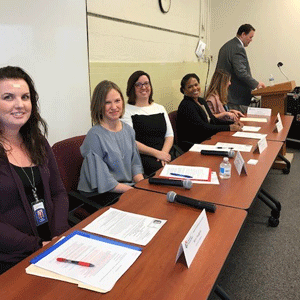 Panelists included: Allison Lowry, Department of Family Services, Ashley Alexander, CSB, Maria Genova, FCPS psychologist, Kerri Hudgins, FCPS social worker, and Claudia Thomas, FCPS Family Engagement Specialist. Among the remarks, Ms. Thomas highlighted shared that some parents who are reunited with their children after long periods of time feel sad that their child does not show affection toward them and may not understand why. FCPS programs “Parent Project” and “Kids That Hope” are available through the schools to help. Lowry added that DFS offers programs in multiple languages as well. Neighborhood Networks, adolescent classes that cover bonding and attachment issues, and a mentoring program are all available to help. Panelists unanimously shared that parents of recent newcomers are typically very resourceful, interested in their children’s success, are flexible and adaptable and want more for their children than they had growing up.
Panelists included: Allison Lowry, Department of Family Services, Ashley Alexander, CSB, Maria Genova, FCPS psychologist, Kerri Hudgins, FCPS social worker, and Claudia Thomas, FCPS Family Engagement Specialist. Among the remarks, Ms. Thomas highlighted shared that some parents who are reunited with their children after long periods of time feel sad that their child does not show affection toward them and may not understand why. FCPS programs “Parent Project” and “Kids That Hope” are available through the schools to help. Lowry added that DFS offers programs in multiple languages as well. Neighborhood Networks, adolescent classes that cover bonding and attachment issues, and a mentoring program are all available to help. Panelists unanimously shared that parents of recent newcomers are typically very resourceful, interested in their children’s success, are flexible and adaptable and want more for their children than they had growing up.
####
- Learn more information on FCPS’ student safety and wellness efforts.
- Subscribe to FCPS’ Healthy Minds blog.
- Learn more about pediatric mood and anxiety research from the National Institute of Mental Health
- Keep up to date with the CSB’s weekly news; sign up here.
- Follow the CSB, the agency that helps link people who have mental illness, substance use disorders and/or developmental disabilities to local resources and services, on social media: Facebook and Twitter.
Contact for news media inquiries: CSB Communications Team, 703-324-7000.

